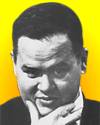
|
John Wilder Tukey
(16 Jun 1915 - 26 Jul 2000)
American mathematician and statistician who coined (1944) the term "bit," (from "binary digit") for the 1s and 0s of binary code. He was first (1958) to use the term "software" in print (claimed to be coined by Paul Niquette, 1953). With J. W. Cooley, he introduced the important fast Fourier transform algorithm (1965), with wide application to the physical sciences.
|
Science Quotes by John Wilder Tukey (8 quotes)
“What’s the collective noun for a group of statisticians?”
"A quarrel."
"A quarrel."
— John Wilder Tukey
In Sharon Bertsch McGrayne, The Theory that Would Not Die: How Bayes’ Rule Cracked the Enigma Code, Hunted Down Russian Submarines, and Emerged Triumphant from Two Centuries of Controversy (2011), 51. The author cryptically footnotes the source as “Tukey, according to Brillinger e-mail.” Presumably, these would be John W. Tukey (1915-2000) and his student David R. Brillinger (1937-)
Far better an approximate answer to the right question, which is often vague, than an exact answer to the wrong question, which can always be made precise.
— John Wilder Tukey
In 'The Future of Data Analysis', Annals of Mathematical Statistics (1962), 33, No. 1, 13-14.
Hubris is the greatest danger that accompanies formal data analysis, including formalized statistical analysis. The feeling of “Give me (or more likely even, give my assistant) the data, and I will tell you what the real answer is!” is one we must all fight against again and again, and yet again.
— John Wilder Tukey
In 'Sunset Salvo', The American Statistician (Feb 1986), 40, No. 1, 75.
The best thing about being a statistician is that you get to play in everyone’s backyard.
— John Wilder Tukey
In David Leonhardt, 'John Tukey, 85, Statistician; Coined the Word ‘Software’', New York Times (28 Jul 2000). No citation, except “Mr. Tukey once told a colleague.”
The combination of some data and an aching desire for an answer does not ensure that a reasonable answer can be extracted from a given body of data.
— John Wilder Tukey
In 'Sunset Salvo', The American Statistician (Feb 1986), 40, No. 1, 74-75.
The greatest value of a picture is when it forces us to notice what we never expected to see.
— John Wilder Tukey
In Exploratory Data Analysis (1977), vi. Cited in epigraph, Chandrika Kamath, Scientific Data Mining: A Practical Perspective (2009), 209 .
Theorem proving is seductive—and its Lorelei voices can put us on the rocks.
— John Wilder Tukey
In 'Sunset Salvo', The American Statistician (Feb 1986), 40, No. 1, 74.
There are diverse views as to what makes a science, but three constituents will be judged essential by most, viz: (1) intellectual content, (2) organization into an understandable form, (3) reliance upon the test of experience as the ultimate standard of validity. By these tests, mathematics is not a science, since its ultimate standard of validity is an agreed-upon sort of logical consistency and provability.
— John Wilder Tukey
In 'The Future of Data Analysis', Annals of Mathematical Statistics (1962), 33, No. 1, 5-6.
 In science it often happens that scientists say, 'You know that's a really good argument; my position is mistaken,' and then they would actually change their minds and you never hear that old view from them again. They really do it. It doesn't happen as often as it should, because scientists are human and change is sometimes painful. But it happens every day. I cannot recall the last time something like that happened in politics or religion.
(1987) --
In science it often happens that scientists say, 'You know that's a really good argument; my position is mistaken,' and then they would actually change their minds and you never hear that old view from them again. They really do it. It doesn't happen as often as it should, because scientists are human and change is sometimes painful. But it happens every day. I cannot recall the last time something like that happened in politics or religion.
(1987) -- 


